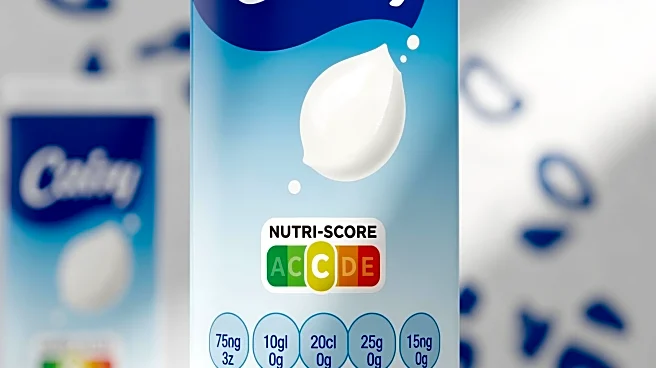What's Happening?
Nutri-Score, a nutrition labeling scheme, has publicly criticized Danone for allegedly misleading consumers about the healthiness of its drinkable yogurts and protein drinks. The controversy centers around
the sugar content in Danone's products, which Nutri-Score claims is not prominently displayed, potentially creating a 'health halo' effect. Danone, once a supporter of Nutri-Score, has withdrawn from using the labeling system after it reclassified dairy drinks as beverages, affecting their Nutri-Score ratings. This reclassification means that high-sugar dairy drinks could receive lower scores, ranging from D to E, while sugar-free options might achieve a B. Danone argues that this classification misrepresents the nutritional qualities of its products and could confuse consumers.
Why It's Important?
The dispute between Nutri-Score and Danone highlights the challenges in nutrition labeling and consumer transparency. As major brands like Danone and Nestlé pull back from Nutri-Score, the scheme's influence in the EU may be waning. This situation underscores the importance of clear and accurate labeling in guiding consumer choices and promoting public health. The outcome of this disagreement could impact how nutrition labeling systems are perceived and adopted across Europe, potentially influencing regulatory approaches and consumer trust in food labeling.
What's Next?
Nutri-Score's future in the EU appears uncertain as major brands reconsider their participation. If Nutri-Score aims to regain support, it may need to address the concerns raised by companies like Danone and adapt its algorithm to better reflect the nutritional value of diverse products. Meanwhile, Danone continues to advocate for a harmonized, science-based nutritional information system across the EU, suggesting that alternative labeling schemes could emerge.
Beyond the Headlines
The debate over Nutri-Score and Danone's products raises broader questions about the role of added sugars in consumer health and the ethical responsibilities of food companies in marketing their products. As consumers become more health-conscious, transparency in labeling and marketing practices will be crucial in maintaining trust and promoting healthier choices.










